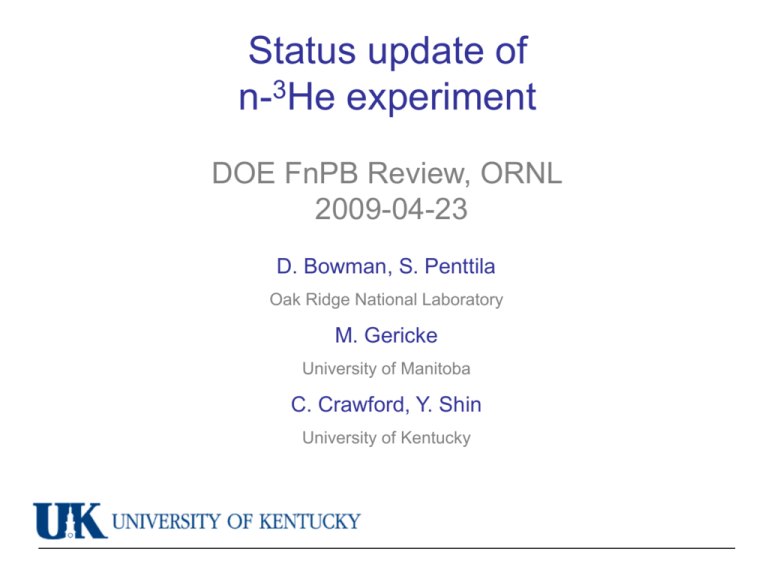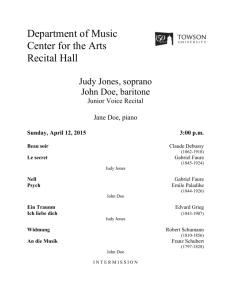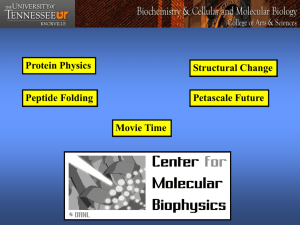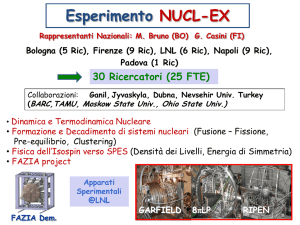n3he_review - University of Kentucky
advertisement

Status update of n-3He experiment DOE FnPB Review, ORNL 2009-04-23 D. Bowman, S. Penttila Oak Ridge National Laboratory M. Gericke University of Manitoba C. Crawford, Y. Shin University of Kentucky DOE FnPB Review, ORNL, 2009-04-23 #2 Outline Executive summary Experimental team Scientific motivation Projected schedule • • • Funding profile FnPB infrastructure needed Summary theory calculations statistical sensitivity systematics negligible Experimental design • • • • experimental layout solenoid design spin flipper design 3He target / drift chamber R&D at LANL DOE FnPB Review, ORNL, 2009-04-23 #3 Executive summary n-3He experiment approved by the FnPB PRAC, 2008-01-07 • recent progress in experimental design • • • • experience on hadronic PV experiments at LANL funding profile • • • major components based on similar NPDGamma instrumentation can reuse NPDGamma electronics / power supplies capable experimental team • full 4-body calculation of PV observable R&D projects on target/detector design at LANL new spin flipper design permitting compact / less expensive layout preliminary holding field design leverage existing hardware / technology • • first measurement of PV in the n-3He reaction University of Manitoba University of Kentucky ORNL operation $100k target / drift chamber NSERC funded $ 57k DAQ / electronics DOE-OJI proposal $120k solenoid, spin flipper, shielding, alignment, design FnPB infrastructure • • • no safety hazards, no LH2 target, new power or cooling requirements minimal modification of FnPB cave – stand for n-3He solenoid technician support for readiness review preparation, setup of experiment Hadronic Weak Interaction (HWI) DOE FnPB Review, ORNL, 2009-04-23 #4 Meson Exchange model (DDH) N N STRONG WEAK (PC) Meson (PV) exchange N N Effective Field Theory (EFT) p-p and nuclei n-3He DOE FnPB Review, ORNL, 2009-04-23 #5 PV Asymmetry PV observables: ~ kn very small for low-energy neutrons S(I): - essentially the same asym. - must discriminate between back-to-back proton-triton 20.578 Tilley, Weller, Hale, Nucl. Phys. A541, 1 (1992) 19.815 4He J =0+ resonance sensitive to EFT coupling or DDH couplings ~10% I=1 contribution (Gerry Hale, qualitative) Theoretical calculations – progress Vladimir Gudkov (USC) • PC Ay(90±) = -1.7±0.3£10-6 R matrix calculation of PC asymmetry, nuclear structure, and resonance properties Anna Hayes (LANL) • A = 3£10-7 PV PV reaction theory Gerry Hale (LANL) • DOE FnPB Review, ORNL, 2009-04-23 #6 No-core shell model calculation with AV18 potential, etc. Michele Viviani et al. (INFN Pisa) • • • • PV A = 3£10-7 full 4-body calculation of scattering wave function calculation of asymmetry within DDH framework progress on calculation of EFT low energy coefficients preliminary – still improving convergence of 0+ wave functions DOE FnPB Review, ORNL, 2009-04-23 #7 Experimental sensitivity to DDH couplings Viviani et al. preliminary n+3Het+p (ppm) -0.1821 -0.1447 0.0267 0.0012 -0.1269 0.0495 Az cont. -0.830 2.373 -0.074 -0.016 -0.410 0.096 DOE FnPB Review, ORNL, 2009-04-23 #8 Experimental setup FnPB cold neutron guide supermirror bender polarizer (transverse) 10 Gauss solenoid 1010 steel flux return -metal shield 3He Beam Monitor transition field (not shown) 3He RF spin rotator FNPB target / ion chamber n-3He longitudinal holding field – suppressed PC asymmetry RF spin flipper – negligible spin-dependent neutron velocity 3He ion chamber – both target and detector DOE FnPB Review, ORNL, 2009-04-23 #9 Solenoid holding field uniformity requirements • • preliminary design • • • solenoid with compensation coils at end for uniformity -metal shield for residual earth’s field 1010 steel flux return to prevent saturation of -metal design parameters • • • • B~ 0.3 G ¢B/2En=10-10 < Az z ~ 0.1± + alignment of wires 3 m length x 50 cm diameter B =10 G for spin flipper j = 9 A/cm winding density I0 = 1560 A (or end-cap windings) simulation using COMSOL 10 Gauss solenoid 1010 steel flux return 3 m £ 50 cm diam. I0=1500+60 A turns j = 8+1 A/cm 4 m £ 55 cm diam. I0 Radio frequency spin rotator extension of design for NPDGamma • P-N Seo et al., Phys. Rev. ST Accel. Beam, vol 11, 084701 (2008) new resonator for n-3He experiment • • • • transverse horizontal RF B-field longitudinal / transverse flipping no fringe field - 100% efficiency compact geometry - efficient - • small diameter solenoid matched to driver electronics for NPDGamma spin flipper prototype design • • parasitic with similar design for nEDM guide field near cryostat fabrication and testing at UKy – 2009 NPDGamma windings n-3He windings DOE FnPB Review, ORNL, 2009-04-23 #10 Magnetostatic calculation with COMSOL red - transverse field lines blue - end-cap windings 3He MC simulations of sensitivity to proton asymmetry • • including wire correlations A ~ 6 /pN tests at LANSCE FP12 • • • target / ion chamber fission chamber flux calibration prototype drift chamber R&D new beam monitors for SNS design of new ion chamber for NPDGamma, test at LANL DOE FnPB Review, ORNL, 2009-04-23 #11 LANSCE FP12 absolute neutron flux DOE FnPB Review, ORNL, 2009-04-23 #12 LANSCE FP12 3He chamber R&D DOE FnPB Review, ORNL, 2009-04-23 #13 DOE FnPB Review, ORNL, 2009-04-23 #14 LANSCE FP12: test of NPDGamma monitors Left: LANL FP12 beam line with new beam monitor Below: new beam monitor signal at 100 mA proton beam current and neutron beam cross-section. Inverted Signal Comparison of beam monitors DOE FnPB Review, ORNL, 2009-04-23 #15 (same gain) New monitors for SNS RMS RMS Old monitors used for NPDGamma at FP12 n-3He DOE FnPB Review, ORNL, 2009-04-23 #16 collaboration J.D. Bowman (PI), S.I. Penttilä M.T. Gericke (PI), S.A. Page, Mark McCrea University of Manitoba C.B. Crawford (PI), Y. Shin, E. Martin University of Kentucky C. Gillis, J. Mei J. Martin V. Gudkov University of South Carolina M. Viviani INFN, Sezione di Pisa A. Klein, A. Salas-Bacci, A. Hayes, G. Hale Los Alamos National Lab R. Mahurin P.-N. Seo Triangle Universities Nuclear Lab L. Barron Universidad Nacional Autónoma de México Oak Ridge National Laboratory Indiana University University of Winnipeg University of Tennessee DOE FnPB Review, ORNL, 2009-04-23 #17 Projected schedule ORNL Jan 2010 – Jan 2011 • Offsite, LANL June 2009 – Aug 2010 • NPDGamma data-taking • • Aug 2010 – Dec 2010 • • Construction of solenoid Test of field uniformity, alignment procedures Sept 2010 – Nov 2010 • Feb 2011 – Mar 2011 • • Installation at FnPB Commissioning Apr 2011 – Sept 2011 • 3He data-taking Construction of new RFSF resonator at ORNL Construction of 3He ion chamber at Univ. Manitoba DAQ electronics and software production at Univ. Kentucky test RFSF, 3He chamber, and DAQ at LANL FP12 window of opportunity for the n-3He experiment between NPDGamma and Nab (2011) DOE FnPB Review, ORNL, 2009-04-23 #18 Funding Profile University of Manitoba $100k • • target / drift chamber $500k for FnPB-related activities in last 2 years University of Kentucky $ 57k • • DAQ / electronics $40k university funding for R&D ORNL operations • • • • NSERC funded $120k solenoid, spin flipper neutron, gamma shielding design, stands, alignment technician support DOE-OJI proposal Requirement of FnPB infrastructure DOE FnPB Review, ORNL, 2009-04-23 #19 modification of FnPB • retained equipment: - • support stand for solenoid - • polarizer, beam monitor, spin flipper electronics computer interface to chopper and TOF from SNS DC holding field supply beam collimation and shielding, beam stop possible reuse of NPDGamma detector motion stand power & cooling requirements - same as NPDGamma manpower • • shielding calculations, preparation for readiness review 1 month technician support for setup of experiment safety hazards – none • • target – 1 atm inert gas; n+3Het+p (no radiation) radiation shielding: polarizer is still the major background 3He Conclusion DOE FnPB Review, ORNL, 2009-04-23 #20 by doing NPDGamma, n-3He experiments along with existing p-p, p-, n- (few body systems) we can significantly improve statistical uncertainties in DDH couplings and eliminate nuclear structure uncertainties EFT calculations are in progress for few-body systems n-3He is on-track to run after NPDGamma


